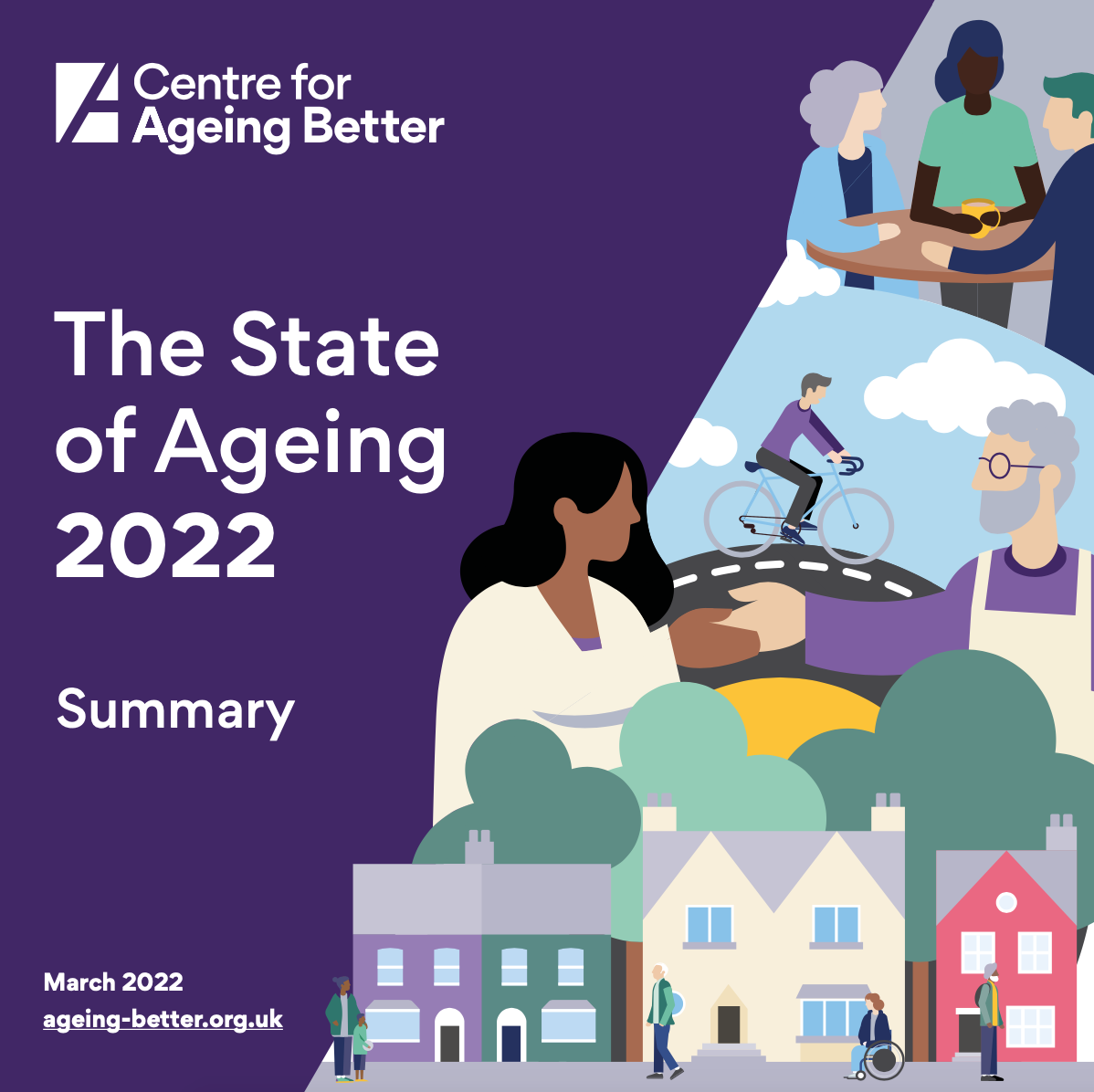Research & Insights: Older adults
Being physically active into old age can help prevent a range of health conditions. Take a look at the insight and research on older adults below to help you shape opportunities for older adults to be active, enabling them to keep fit and healthy into old age.
Active Lives research show that in Lincolnshire...

31% of adults aged 55 – 74 are inactive

59% of adults aged over 75 are inactive
The State of Ageing
‘The State of Ageing 2022’ is the Centre for Ageing Better’s new online, interactive report capturing a snapshot of how people in the UK are ageing today while looking at past trends and our prospects if action isn't taken. It suggests England is becoming an increasingly challenging country to grow old in, with pensioner poverty and levels of poor health increasing.
The report highlights other trends that will have a significant impact on people’s security and quality of life in old age and looks across four areas – work, housing, health, and communities.
Today, in England there are almost 11 million people aged 65 and over (19% of the total population). In 10 years’ time, more than 13 million people will be aged 65 and over (22% of the population).
- New analysis of data suggests England is becoming an increasingly challenging country to grow old in, with pensioner poverty and levels of poor health increasing.
- Fewer than 1 in 5 (19%) people feel enough is being done by the government to support an ageing population.
- Over two thirds (69%) say the needs of older people are overlooked in society today.
- More than two thirds (68%) support appointing an independent Commissioner to safeguard the rights of older people.
- The number of years we can expect to spend in good health, without a disabling illness, continues to decline; this is now 62.4 years for men and 60.9 years for women.
Read the summary report

Centre For Ageing Better
The Centre for Ageing Better is a charitable foundation whose vision is to create a society where everyone can enjoy later life. Their work includes building the evidence base around the most effective ways to get people more active.
Follow the links to some of their research and reports below.
Raising the Bar on Strength and Balance: The importance of community-based provision.
This report by the Centre for Ageing Better and the University of Manchester’s Healthy Ageing Research Group shows a need for sustained, targeted funding for community-based strength and balance programmes, which can reduce the risk of falls in older people.
Ageing in a rural place
This paper provides a commentary on the challenges and opportunities for people ageing in rural and coastal places.
This paper draws on data to provide insights across employment, housing, health and communities. It aims to raise awareness of issues among decision-makers and to identify some of the priorities for action if people approaching later life in rural areas are to be supported to enjoy later life.
Older adults and physical inactivity
In 2019 Active Lincolnshire, working with Let’s Move Lincolnshire, commissioned Social Change UK to survey and interview older people (55+ years) and partners across the county in order to understand how we could promote and support regular daily activity among older adults in Lincolnshire.
The produced this report: A scoping exercise to explore physical inactivity in older adults. The full report can be viewed below.
Spotlight on older adults report
Sport England's Spotlight on Older Adults and Their Relationship with Sport and Physical Activity report delves deeper into differences in inactivity levels at key life stages.
The report looks to inform and help to shape approaches to support people to get and remain active in a way that’s right for them.
Active travel and mid-life: Understanding the barriers and enablers to active travel
This interim report by the Centre for Ageing Better provides a summary of the evidence reviews on attitudes to active travel among people aged 50-70 and the role the built environment plays.
Keeping physically active in mid-life helps to delay the onset and progression of many age-related health conditions and plays an important role in helping to manage the impact of health conditions once we develop them. Despite its importance, levels of physical activity begin to drop in mid-life.
This is also true for active travel – that is, walking and cycling for everyday journeys. Although it is one key approach to building regular physical activity into daily life, people in mid and later life are less likely to participate in active travel than younger age groups.
This includes evidence reviews of the existing literature and primary qualitative research to address gaps identified in those evidence reviews.
Keep on moving: Understanding Physical Inactivity among 50-70 year olds
This report, published by Centre for Ageing Better, explores the experiences, barriers and motivations for physical activity among people in their 50s and 60s.
Physical inactivity is one of the leading risk factors for poor health and disability in later life even before the COVID-19 pandemic. But now, lockdowns and restrictions on social activity mean that many people are less active than ever before.
Centre for Ageing Better looked at the existing research base and spoke to people in this age group about their activity levels.
Barriers to physical activity need to be addressed in local areas, using a whole systems approach to support physical activity in the community. The UK's ageing population means society needs to take rapid action to improve people’s physical activity levels so that we are all able to enjoy our longer lives.
Best foot forward: Exploring the barriers and enablers to active travel among 50-70 year olds
This report summarises the findings of the work from the Centre for Ageing Better on active travel and, for the first time, sets out the factors that govern active travel behaviours in people aged 50 to 70.
Active travel - making day-to-day journeys by walking or cycling - in an effective way of bringing more physical activity into our everyday lives. Increasing our physical activity levels will make us healthier and help us to lead longer and more independent lives.
However, levels of physical activity and of active travel drop off rapidly with age and it's essential that we target people in mid-life to address this decline. This research report summarises the findings of the work and sets out the factors that govern active travel behaviours in people aged 50 to 70 across the UK.
The research finds that these factors are wide-ranging and include things such as infrastructure; confidence; having suitable role models; and enjoyment of the outdoors. These disparate factors must be addressed by adopting a whole-systems approach in order to achieve real change in people's travel habits.







